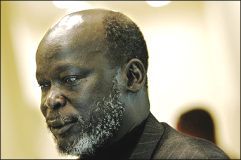Sudanese rebel leader wants large force in Darfur
By Evelyn Leopold
UNITED NATIONS, Feb 8 (Reuters) – The leader of southern Sudan’s main rebel group called on Tuesday for up to 30,000 Sudanese and international troops to stop the fighting in Darfur, demobilize combatants and institute power-sharing.

Rebel leader John Garang and Ali Osman Mohammed Taha, Sudan’s vice president, addressed the U.N. Security Council on a landmark agreement they signed last month ending a 21-year old civil war in the south.
Garang, who will become a vice president in Khartoum, said plans that produced the north-south agreement could be applied to Darfur — a deadline to reach an accord, self-government, military arrangements, power-sharing and a division of wealth in the arid west.
Even though his movement was not part of the government or rebels in Darfur, Garang said, “We have a moral and political obligation to assist Sudan achieve a comprehensive peace.”
He proposed a new military force in Darfur of 15,000 to 30,000 soldiers and police — a third from the government and a third from his Sudanese People’s Liberation Army. The remainder should come outside troops to help the African Union, which has a 1,200-strong force on the ground and plans to increase it to 3,200 by mid-April.
Jan Pronk, the U.N. envoy for Sudan, said the government was incapable of reining in the Arab militias known as the Janjaweed. He said the Darfur rebels were making a power grab and an African Union peacekeeping force needed to be beefed up with many more troops.
Baba Gana Kingibe, the African Union representative in Sudan, said the number of troops was not the issue.
“So far, I have not found that the parties have demonstrated sufficient political will or commitment to finding a lasting solution to the crisis,” he said.
But all sides, including U.N. officials, exhibited some frustration in the ongoing conflict with no agreed clear course of action for the sprawling arid western region of Sudan, where more than 70,000 people have been killed, women and girls raped daily and 2 million made homeless.
Secretary-General Kofi Annan in a report on Monday blamed Khartoum for failing to disarm pro-government militia and arrest those responsible for the brutalities.
Both Taha and Garang pleaded with the council to push for reconstruction assistance — as promised when the north-south peace agreement was signed — and said peace plans rather than prosecution of war criminals should be the top priority.
Taha said the impoverished country, despite its oil wealth, should be free of economic sanctions and that foreign debt should be completely written off. Garang warned that waiting for a solution in Darfur before the north-south pact was implemented would “surely lead to a serious disaster.”
The 15-nation Security Council is currently debating sanctions against those responsible for the violence that has killed at least 70,000 people and made 2 million homeless.
The council also is considering trials for perpetrators of atrocities on a sealed list drawn up by a U.N.-appointed commission, which last week found evidence of heinous crimes in Darfur but stopped short of labeling the violence genocide.
Taha rejected any outside tribunal dealing with Sudanese citizens and said his government had its own commission that would implement recommendations of the U.N. inquiry.
But he said the need to bring the accused to justice “should not distract us from the need to realize peace first and to put an end to all hostilities.”
Garang said the militia, once armed by the government and known as Janjaweed, needed to be punished — but only after peace was achieved. Otherwise “that would be putting the cart before the horse, in which case both the cart and the horse would not move and they would go nowhere.”
